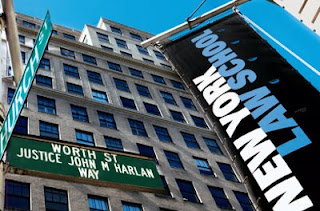I will be moderating the bankruptcy panel and will be sure to encourage discussion on the role of bankruptcy law in the sale of the Sacramento Kings.
* * *
The New York Law School Sports Law Society and the Institute for Information Law and Policy
Presents:
The Fourth Annual Sports Law Symposium
Friday, February 22, 2013
185 West Broadway
W201 (Events Center)
Fee: Please note that if you registered for the original date, postponed due to Hurricane Sandy you are automatically registered for the make-up event on February 22.
$45 for attorneys (includes CLE’s)
$45 for attorneys and professionals not seeking CLE credits (No CLE credit)
$15 for outside students
Free for current NYLS students (with a valid school ID)
This CLE program has been approved for a maximum of three hours of CLE credit for both transitional and non-transitional attorneys. New York Law School offers tuition assistance for attorneys who may have difficulty attending CLE events due to cost considerations. Please visit: http://www.nyls.edu/academics/cle/tuition_assistance to see if you qualify.
Tentative PANELS
12:00 pm - Registration Opens
12:45 pm - Opening Remarks
1:00 pm - 2:00 pm - Bankruptcy Issues in Sports (1 CLE Credit - Professional Practice ("P.P.") )
2:15 pm - 3:15 pm - Analysis and Impact of the Concussion Litigation (1 CLE Credit - P.P.)
3:30 pm - 4:30 pm - Negotiating Media Rights Acquisitions (1 CLE Credit - P.P.)
4:45 pm - 5:30 pm - Breaking Into the Sports Industry Q&A
5:30 pm - Networking Reception
PANELISTS *
Jodi Balsam, Associate Professor at NYLS; Former Counsel for Operations and Litigation at the NFL
Robert Boland, Professor of Sports Management & Sports Business at New York University
Robert Erb '91, CEO at Schutt Sports; Adjunct Professor at New York Law School
Frank Golding, YouTube Director, Head of Sports for North America at Google
Frank Hawkins, Partner at Scalar Media Partners; Former SVP Business Affairs at the NFL Darren Heitner, Founder of the Sports Agent Blog; Partner at Wolfe Law; Contributor at Forbes Magazine;
Jeannine Kenney, Associate Counsel at Hausfeld LLC; Plantiff’s Liason Counsel for NFL concussion litigation
J. Carlos Kuri, Vice President and General Counsel at New York Red Bulls
Jeffrey Levitan '83, Partner at Proskauer Rose LLP
David Mayer, Principal Counsel at ESPN, Inc.
Michael McCann, Legal Analyst at SI & NBA TV; Professor & Director of Sports and Entertainment Law Institute at UNH Law;
Matthew Pace, Partner at Arent Fox LLP
Irwin Raij, Partner and co-chair of the Sports Industry Team at Foley & Lardner LLP
Robert Raiola, CPA; Sports & Entertainment Group Manager at Fazio, Mannuzza, Roche, Tankel, LaPilusa, LLC
Frank Saviano, Associate at Proskauer Rose LLP
Alan Schwarz, Reporter at New York Times
David Soskin '08, Counsel at ESPN, Inc.; Adjunct Professor at New York Law School
Meredith Wolff, Associate Staff Attorney at NHL Enterprises, L.P.